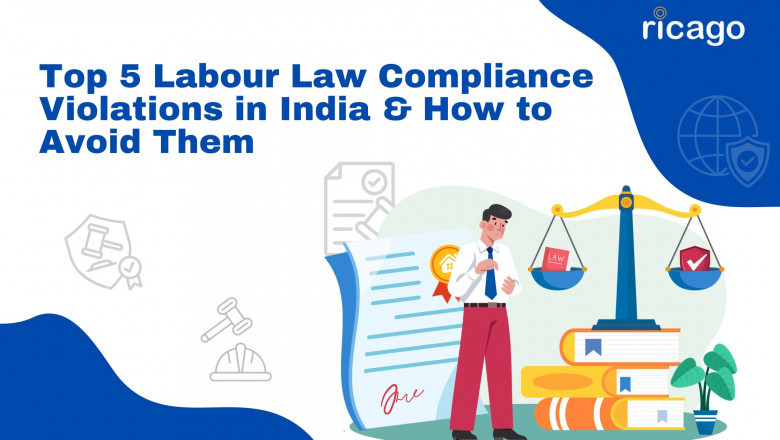views
Understanding labour laws in India is essential for every employer and HR professional. Non-compliance with these laws can lead to penalties, legal actions, and damage to a company's reputation. Here are the five most common violations and some tips to help businesses maintain labour law compliance.
1. Non Payment or Late Wage Payments
Violation: Many employers delay salary payments or do not pay the minimum wages required by the Minimum Wages Act of 1948 and the Payment of Wages Act of 1936.
How to Avoid: Ensure salaries are disbursed on time, ideally before the 7th or 10th of each month. Pay at least the minimum wage required for your industry and location. Maintain accurate wage registers and records to support labour law compliance..
2. Failure to Comply with PF and ESI Contributions
Violation: Non-registration of employees or delays in contributions under labour laws, including the Employees' Provident Funds Act, 1952, and the ESI Act, 1948.
How to Avoid: Register all eligible employees with the EPFO and ESIC. Ensure that monthly contributions are deposited in a timely manner. Use payroll systems that integrate with labour compliance tracking.
3. Labour Misidentification
Violation: Labelling full time employees as independent contractors or trainees to bypass mandatory labour regulations in India.
How to Avoid: Classify workers by their job nature, reporting structure, and contract terms. Use compliant employment contracts and consult legal experts regularly.
4. Lack of Appointment Letters & Statutory Registers
Violation: Failure to issue appointment letters or maintain required statutory registers, such as attendance, wage, leave, and maternity records, under applicable labour laws in HR..
How to Avoid:
Issue appointment letters to all employees stating job roles, wages, and benefits. Maintain necessary statutory registers manually or via an HRMS for labour law compliance.
5. Ignoring POSH Compliance
Violation: Non-compliance with the Sexual Harassment of Women at the Workplace (Prevention, Prohibition, and Redressal) Act, 2013 commonly referred to as the POSH Act.
How to Avoid: Establish an Internal Complaints Committee (ICC) for workplaces with ten or more employees. Conduct awareness sessions and prominently display the POSH policy. This step is a crucial part of any labour law compliance checklist.
Labour Law Compliance Checklist for Employers
To ensure complete compliance with labour laws:
-
Stay updated about changes to labour laws in India.
-
Perform audits every quarter or every six months.
-
Maintain digital or physical statutory records updated.
-
Train HR teams on the latest labour regulations in India.
-
Utilize automated compliance management tools
Conclusion
Adhering to labour laws in India is crucial for avoiding penalties and promoting a healthy work environment. Employers can simplify compliance and build trust by following the appropriate labour regulations, ensuring timely payments, and maintaining accurate records. Taking a proactive approach today will lead to smoother operations in the future.
Invest in a reliable labour law compliance tool tailored for your industry in India. Ricago offers a scalable platform that simplifies governance, giving you visibility, control, and confidence in your compliance operations.






















Comments
0 comment